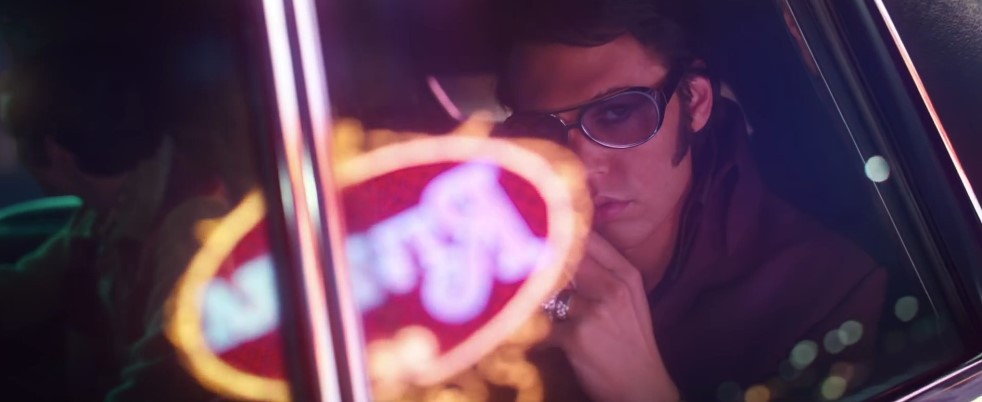While the approach and perspective of Elvis may not elevate it above other such musical biopics, the central performance and incredible production make it worth your time.
Like aging rock stars embarking on a final farewell tour to cash in on their popularity one last time, the musical biopic is a subgenre of film that is increasingly trying to make money off of nostalgia. Especially in recent years we have seen a significant number of high-profile films releasing with a significant focus on a very popular musician. From movies like Get On Up to Straight Outta Compton, these films bring renewed interest to the careers of artists who are, frankly, well past their prime if not already passed away. Cleverly they are constructed as much to benefit the estates of their subject matter, as to give fans the chance to celebrate their favorite musicians in a new way.
Elvis
Directed By: Baz Luhrmann
Written By: Baz Luhrmann, Sam Bromell, Jeremy Doner, Craig Pearce
Starring: Austin Butler, Tom Hanks, Olivia DeJonge
Release Date: June 24, 2022
The latest film to join this party is Elvis. Following in the footsteps of recent musical biopics like Bohemian Rhapsody, and Rocketman, this film takes the rags-to-riches storyline. Unlike Yesterday or Weird: The Al Yankovic Story, this is a film that isn’t trying to blend fiction and non-fiction. Instead, it tries its best to be true to the original story, but also ratchets up the flare for entertainment purposes. Director Baz Luhrman is known for his musical spectacles, and his latest film is no exception to his lavish production style and flamboyant showmanship.
Elvis chooses the singer’s manager, Colonel Tom Parker, to be the film’s narrator from his deathbed. Parker recalls young Presley’s fascination with African-American blues, and as a showman, recognized his potential to cater to white audiences with the teen’s sex appeal. Under the guidance of Parker, Elvis began a lucrative career in the 1950’s becoming known for his suggestive performances which went against the strict social norm of the time. Parker does his best to contain the more controversial elements of Elvis’s music, much to the chagrin of Elvis himself.

As time moves on, Elvis’ career takes a turn for the worse. His stage presence no longer appeals to younger crowds, and Parker’s insistence on sticking with the classics makes Elvis seem old fashioned in the rapidly-changing social environment of the 1960’s. To revive his career, Parker has Elvis become a movie and television star, but eventually his luck runs out there as well. Elvis even tries new management, but ends up back in Parker’s grasp because of his declining mental health, lack of support, and legal troubles.
Elvis’ unfortunate demise is well-publicized, but, as you may be able to surmise, the film holds nothing back about putting the blame squarely on Parker’s lap. Framing the film through his perspective while on his deathbed does provide a small sliver of sympathy. The story unfolds like a confession, and in doing so suggests an admission of guilt. But Parker continues to candy coat some of his more reprehensible actions. He seems to take pride in the ways he took advantage of Elvis and his family, making it seem like what he did is what anyone would have done in a similar situation.
Some could say this is a controversial approach to the story of Elvis. Instead of celebrating his accomplishments as an artist, it is seemingly showing us a behind-the-scenes look at how he was held back by those who were closest to him. But I would argue the film isn’t controversial enough. It’s one thing to recognize the way Elvis was exploited, but another to ignore the way he reappropriated other people’s music for his own gain. Much in the same way that Bohemian Rhapsody largely glossed over the more controversial aspects of its central character’s life, Elvis is more about sticking to a singular perspective than it is filling in all of the details.

Of course, this approach keeps the singer’s estate happy, which is necessary for them to grant a license to begin with. This is exactly the biggest problem facing these types of films – they can’t really be too critical of their subject matter as you could with a traditional historical biopic. That’s fine from an entertainment perspective, especially if the purpose of the film is primarily to celebrate the artist, rather than paint an accurate picture. In the case of Elvis, any discussion of his work as an artist requires consideration of his decline and premature death. Therefore, while I would have appreciated Elvis diving into the nitty gritty a little bit more than it does, I do feel the subject matter was handled well enough for the film’s intended purpose.
That purpose rings through your ear drums and cascades across your peripheral as soon as you hear Austin Butler belt out his first note on stage as Elvis Presley. Director Baz Luhrmann knows how to put on a show, and when this film is rocking it really does rock. With dynamic camera movements and incredible sound, this depiction of Elvis manages to capture his incredible stage presence and undeniable charisma. Certainly the look is modernized and embellished for the big screen, but it’s the type of impression that probably gets you as close as anything to what it would have been like watching Elvis perform in person.
Butler’s investment into the character of Elvis is specifically the type of performance to send chills down your spine and give you goosebumps. We’ve been inundated with so many caricatures of Elvis over the years that it is refreshing to see him come alive as a person and not just a character. Specifically the aspect of his performance which I found the most interesting was the way Butler conveys to the audience the increasing burden of show business through the years.

At first Elvis seems like he doesn’t know any better, he’s just trying to be like his idols. I loved the camaraderie the film depicts with other artists like B.B. King, and at that time Elvis is driven by his love of music and others are fascinated with him for the passion he brings. But his success is a double-edged sword because music comes to mean something different. Instead of his passion, it becomes a cross he must come to bear. As his fame grows, his audiences have expectations for him, which can be contrary to what he as an artist wants to do.
Elvis ends up sacrificing his artistic integrity for commercial success. The life that music gave him early in his career becomes something that is slowly killing him at the end. Watching there on the sideline is Colonel Tom Parker, cheering him along as if he was still a circus act conning people out of their money. It’s a fitting finale, showing off two sides of the showbiz coin – those driven by the art and those driven by the money. The film itself seems to chart a path right down the middle.















